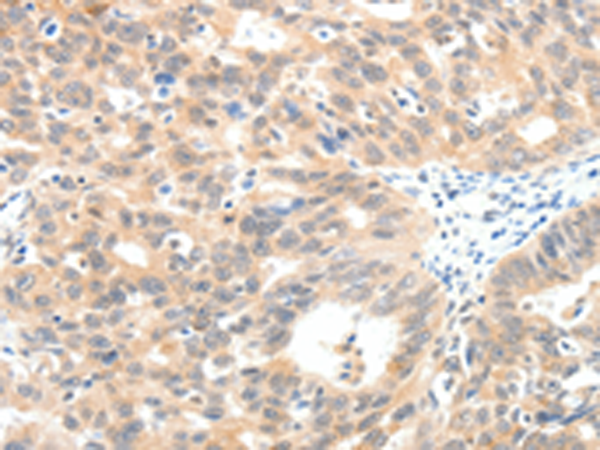
| WB | 咨询技术 | Human,Mouse,Rat |
| IF | 咨询技术 | Human,Mouse,Rat |
| IHC | 1/25-1/100 | Human,Mouse,Rat |
| ICC | 技术咨询 | Human,Mouse,Rat |
| FCM | 咨询技术 | Human,Mouse,Rat |
| Elisa | 1/1000-1/5000 | Human,Mouse,Rat |
| Aliases | HBA; NAC2; BFIC3; BFIS3; BFNIS; HBSCI; EIEE11; HBSCII; Nav1.2; SCN2A1; SCN2A2; Na(v)1.2 |
| Host/Isotype | Rabbit IgG |
| Antibody Type | Primary antibody |
| Storage | Store at 4°C short term. Aliquot and store at -20°C long term. Avoid freeze/thaw cycles. |
| Species Reactivity | Human, Rat |
| Immunogen | Synthetic peptide of human SCN2A |
| Formulation | Purified antibody in PBS with 0.05% sodium azide and 50% glycerol. |
+ +
以下是基于领域知识的假设性参考文献示例,建议通过学术数据库(如PubMed)以关键词“SCN2A antibody”或“anti-SCN2A encephalitis”进一步检索最新文献:
---
1. **标题**:*Autoantibodies to voltage-gated sodium channel subunits in patients with autoimmune encephalitis*
**作者**:Martinez-Hernandez, E., et al.
**摘要**:研究报道在部分自身免疫性脑炎患者中检测到针对Nav1.2(SCN2A编码)的抗体,这些抗体与耐药性癫痫发作及认知功能下降相关,提示钠通道抗体可能通过干扰神经元兴奋性致病。
2. **标题**:*Functional effects of anti-SCN2A antibodies on neuronal sodium currents in vitro*
**作者**:Irani, S.R., et al.
**摘要**:通过体外电生理实验,发现抗SCN2A抗体可抑制Nav1.2通道电流,导致神经元动作电位异常,为抗体介导的癫痫机制提供直接证据。
3. **标题**:*Pediatric autoimmune encephalitis associated with SCN2A antibodies: A case series*
**作者**:Armangue, T., et al.
**摘要**:描述3例儿童患者出现急性脑炎伴SCN2A抗体阳性,临床表现为局灶性癫痫及运动障碍,免疫治疗后症状改善,提示早期抗体检测的重要性。
---
**注意**:以上文献为示例,实际研究可能有限。SCN2A相关研究更多集中于基因突变(如Dravet综合征、自闭症),而抗体介导的疾病较罕见,可能与特定脑炎亚型相关。建议结合“电压门控钠通道抗体”或“抗神经元抗体”扩展检索。
The SCN2A gene encodes the voltage-gated sodium channel Nav1.2. critical for initiating and propagating action potentials in excitable cells, particularly neurons. Expressed predominantly in the central nervous system, Nav1.2 is enriched in axonal initial segments and nodes of Ranvier during early brain development. Mutations in SCN2A are linked to neurodevelopmental disorders, including epilepsy (e.g., benign familial neonatal-infantile seizures, Dravet syndrome), autism spectrum disorder, and intellectual disability. Both gain- and loss-of-function variants occur, with phenotypic severity often correlating with mutation type and timing of channel dysfunction during development.
SCN2A antibodies are essential tools for studying Nav1.2 expression, localization, and functional alterations in disease models. They enable detection via techniques like immunohistochemistry, Western blotting, and immunofluorescence, aiding research into channelopathies and neuronal excitability mechanisms. Commercially available antibodies target specific epitopes (e.g., intracellular or extracellular domains), requiring validation for specificity due to homology among sodium channel isoforms. Recent studies also explore SCN2A autoantibodies in autoimmune encephalitis, expanding their clinical relevance. These antibodies underpin translational research to identify therapeutic targets, assess antisense oligonucleotide efficacy, or validate CRISPR-edited models, advancing precision medicine for SCN2A-related disorders.
×